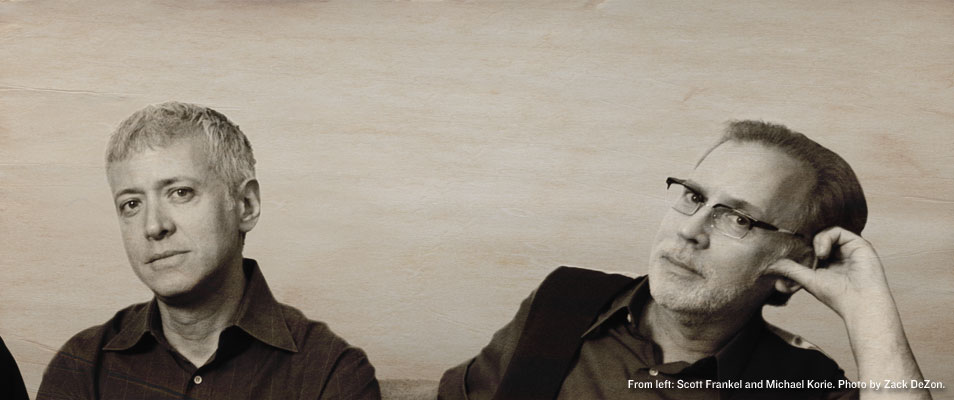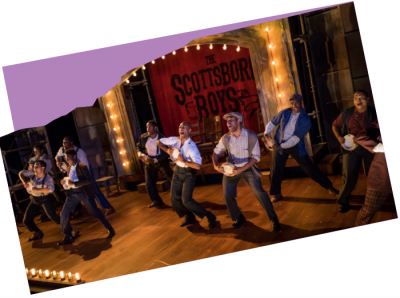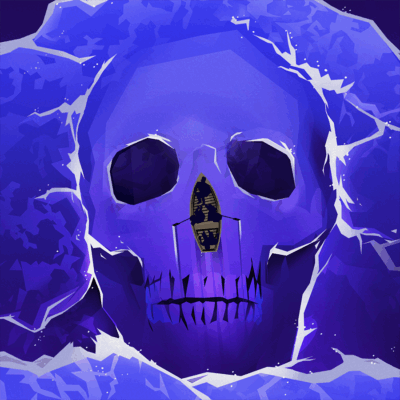Your donation sets the stage for a new season of Boston's most intimate, entertaining and provocative plays and musicals. Our shows make powerful connections with our audiences-- and they are only possible because of you.
Capturing Heaven


Capturing Heaven
How did you first begin working and collaborating with one another?
Michael Korie: I had been working in opera and Scott had been conducting and playing in the pit for various Broadway shows, when a conductor we knew named Michael Barrett decided to make a shotgun wedding. He said, “You two ought to meet each other.” And so we did, and we decided to try working together on a song about the 1939 World’s Fair for a revue that was being put on in Philadelphia [which incidentally never actually got done]. And I just thought Scott was amazing. He could set [to music] pretty much anything I gave to him.
Scott Frankel: When we first met about 20 years ago, Michael almost exclusively gave me lyrics first. He would give me these lyrics that would just go on for pages, and I actually had to ask him for schematics because I could not for the life of me figure out what each section was. There are standard song forms, where there’s an A section and then a B section and then the A section comes back again, but Michael’s lyrics would just go on and on. It was fascinating because nobody writes ABACGFQE or whatever, so it was this sublime kind of jigsaw puzzle that took me to a lot of different places.
Now, however, I’ve learned that if I have a real hunch of what something feels or sounds like, that I will go with it and hand it over to Michael for fine tuning or let him come up with something. It’s a great give-and-take, and sometimes we can meet halfway in the middle, or throw ideas back and forth. I’ve gotten much less precious as I’ve gotten older. Whoever has the best idea wins.
Were you familiar with Todd Haynes’ film Far From Heaven or the work of Douglas Sirk before you started on the musical?
MK: I love Douglas Sirk’s films. The first time I saw one, I just said, “Wait a minute. Why does the dress match the lampshade and the wallpaper?” His films are so stylized and the dialogue is kind of trite and banal; and it’s also directed so weirdly that it almost has this otherworldly quality. So, yes, Sirk was always fascinating to me. And then when I saw Todd Haynes’ film, what I loved was that it copied Sirk’s style but incorporated the real issues of the era that Sirk was not able to put into his screenplays.
SF: Sirk was bound by the Hays Production Code, which dictated the things that one couldn’t do and say in films, which of course included any reference to homosexuality. So in his film, Haynes spins it, by not only talking about race and marriage, but also about homosexuality. He really amps it up. The ’50s was this era of “tea and sympathy,” where everything was all veiled and not explicit, and then Haynes harnesses the two-headed monster of gender and race inequality and fuses homosexuality onto it.
What was the beginning of the process like? How do you get started adapting a movie done in such a distinct visual style?
MK: I was diagnosed with prostate cancer just about when we needed to begin. I’m fine, but I had a long recovery period; and rather than fall behind on the deadline, Scott composed about 90% of the music first. We agreed on hooks and titles, but the music came first. I have an affinity for working that way. Because I started from music, a song doesn’t work for me unless it comes from a musical impulse. If it starts in an unmusical place, you have to do all sorts of musical tricks to keep that balloon in the air. Something has to be musical and buoyant about an idea – the hook.
SF: I did start to do some musical sketches, which is not usually the way that I work. I stopped watching the film, however, to stop hearing the movie score in my head. I love that Elmer Bernstein film score; it’s very lush, and sweeping, with cascading waves of sound and big climaxes and cymbal rolls. It’s wonderful, but I wanted to stop listening to it because I didn’t want what I was doing to be influenced by it. Still the score in the film and the score in our show both erupt with a kind of throbbing passion, and a kind of almost over-the-top quality in the way that the emotions of the characters can finally come cascading out. And even though I wasn’t watching the film, I did have a copy of Todd Haynes’ screenplay, so that the architecture of the film could help me identify the key moments.
Was there a moment that emerged first among the sketches?
MK: I tried to imbue myself with a lot of musicals from the period before I started, and I noticed there was a strange genre of songs that I hadn’t been aware of before – Connecticut songs. Bing Crosby had a Connecticut song, for example, and there were also lots of New England songs like “Moonlight in Vermont.” So I thought, “This is it. This has to be brought back.” Richard and Scott, however, thought I was crazy. But then I got sick and Scott took my idea for “Autumn in Connecticut” and wrote the music first. And that kind of nailed the tone for me.
This show has much more music in it than a traditional book-musical score. How did that structure take shape?
SF: [Playwright and Far From Heaven book writer] Richard Greenburg encouraged me, when we started, to think of the piece in terms of leitmotif, which is an operatic term most associated with Wagner in which each character has a certain musical figure that’s associated with them. It can be a whole theme or a fragment of one. Now I didn’t sit down planning to do that when I wrote the score, but looking back, what Rich said must have filtered into my consciousness because it is very much there.
MK: As it formed, the music really took the place of what the original film did with cinematography, providing shading and color and character stylization. We knew we didn’t want to write a pastiche, derivative score, but we did want to evoke the period. There was a kind of stiltedness about the way people thought; their minds didn’t extend past a certain point. And yet, they were filled with yearning and passion and longing, and that is expressed in the music of the show.
The three principles, Cathy, Raymond and Frank, occupy such different worlds from one another, and from the audience. What was it like to connect to them and tell their stories?
MK: Writing for all these people was a big challenge and a joy for me. Frank, for example, from the very beginning, doesn’t even know what he’s saying. I like him because he’s certainly troubled and interesting, but also kind of loud and a drunk. So when Frank finally does get to a place where he says, “My goodness I actually feel something for this other person,” the words are: “I never knew. I had no conception that this could ever happen.”
SF: In the first act, Frank is Leave it to Beaver or My Three Sons kind of dad-sounding, and then there’s some Mad Men-ish swinging office music that has a kind of jazzy syncopation; he’s very jagged. But then in the second act, when he finally starts to understand and express who he really is, Frank gives a surprisingly rapturous and passionate song in which you get to maybe hear the true, authentic Frank Whitaker and not the trappings of the Dad and the successful Advertising Associate.
MK: It’s tricky because we like to discover characters, but these characters typically don’t know that much about themselves when they sing. They have to learn it. Look at Cathy, for example. She really is living in a dream world and knows very little about herself. Frank knows nothing about himself. And Raymond has some delusions of his own too. During the show, they each discover “reality.”
SF: I don’t often think in terms of the relatability and universality of people’s experiences. There was this kind of half-funny piece I was reading about Ira Glass, who went to see King Lear in Central Park, and said something like “Great performances, but you know, Shakespeare isn’t relatable.” And there’s this notion of, y’know, “Do I relate to the character?” As a judgement. But the pieces that are usually less interesting to me are the ones that are so similar to how the audience lives, that there becomes no filter somehow, or no metaphor. I tend to be drawn towards stories that have the heightened emotional stakes, even though they may be very far away from actual moments and events in people’s lives. There’s something about the ability to empathize with someone’s struggle, even if that struggle is not your own, that is really lovely to me.
What effect does the 1950s setting specifically have on that ability to bridge the distance?
SF: When you look back at pieces of art and literature and theatre from earlier eras and you see the way they are snapshots, it gives you a certain feeling of smug reserve, in that you think “Well, we’ve come so far. What a quaint time.” But I also think that Far From Heaven cuts both ways in terms of those issues, because there’s still a great deal of prejudice about race relations in this country – as well as issues around gender roles, gender equality, and sexual orientation. Even in an era in which gay marriage is fast becoming the law of most of the land, there’s still a great deal of discrimination and intolerance simmering just beneath the surface. So, I think that the piece works as a reminder of a time in this country when things weren’t as evolved, while also making the point that a lot of those issues are still with us. It’s more relevant, and maybe some of the quaintness of the period details can initially disarm you, but I really do think that what goes on in that town is just as atrocious as what goes on in, say, Ferguson. It’s just packaged in a different style, but the content is the same.
MK: I think that when we picture a show set in the 1950s, we’ve been trained by theatre and television to think of bubblegum colors and funny kitchen scenes, and to laugh at the naiveté of that era. The 1950s in this show similarly tries to suck you right back in, but this time it’s not a happy feeling. It’s edgy and interesting and people don’t behave nicely. If you want nice-nice, you can go see Pump Boys and Dinettes. That’s not this 1950s.
– Walt McGough
 Past Productions
Past Productions The Antiquities
The Antiquities Swept Away
Swept Away




